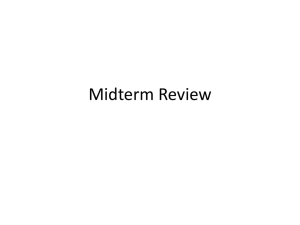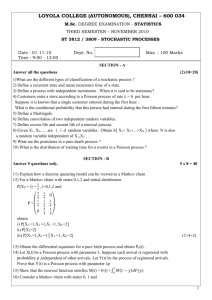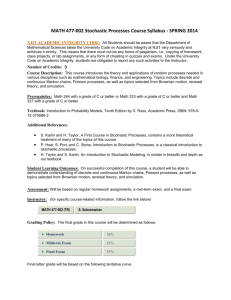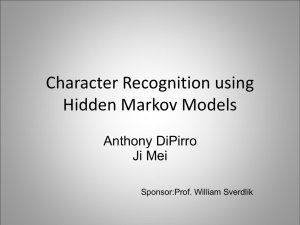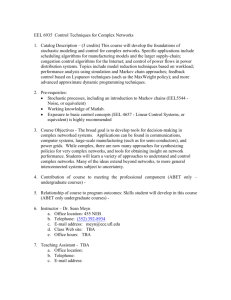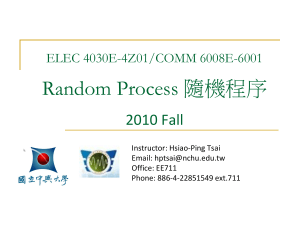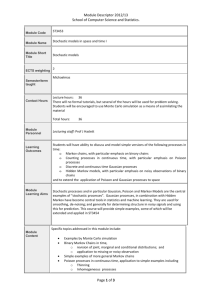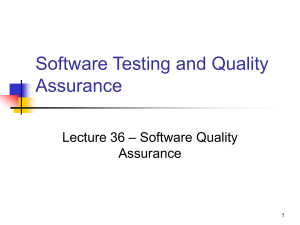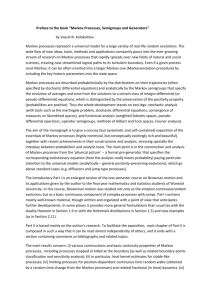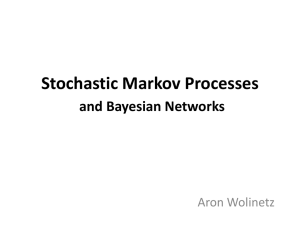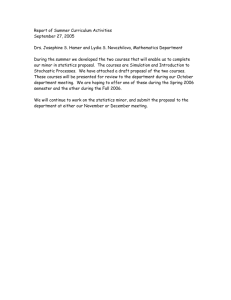Spring 2015 - Associate Chair Home
advertisement
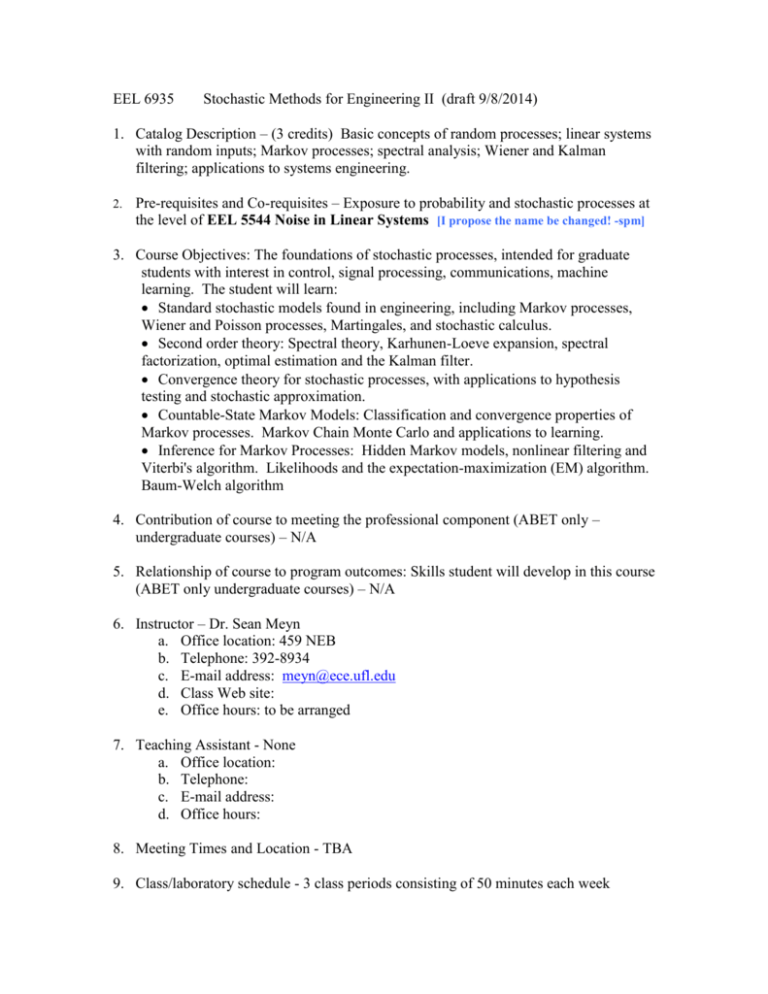
EEL 6935 Stochastic Methods for Engineering II (draft 9/8/2014) 1. Catalog Description – (3 credits) Basic concepts of random processes; linear systems with random inputs; Markov processes; spectral analysis; Wiener and Kalman filtering; applications to systems engineering. 2. Pre-requisites and Co-requisites – Exposure to probability and stochastic processes at the level of EEL 5544 Noise in Linear Systems [I propose the name be changed! -spm] 3. Course Objectives: The foundations of stochastic processes, intended for graduate students with interest in control, signal processing, communications, machine learning. The student will learn: Standard stochastic models found in engineering, including Markov processes, Wiener and Poisson processes, Martingales, and stochastic calculus. Second order theory: Spectral theory, Karhunen-Loeve expansion, spectral factorization, optimal estimation and the Kalman filter. Convergence theory for stochastic processes, with applications to hypothesis testing and stochastic approximation. Countable-State Markov Models: Classification and convergence properties of Markov processes. Markov Chain Monte Carlo and applications to learning. Inference for Markov Processes: Hidden Markov models, nonlinear filtering and Viterbi's algorithm. Likelihoods and the expectation-maximization (EM) algorithm. Baum-Welch algorithm 4. Contribution of course to meeting the professional component (ABET only – undergraduate courses) – N/A 5. Relationship of course to program outcomes: Skills student will develop in this course (ABET only undergraduate courses) – N/A 6. Instructor – Dr. Sean Meyn a. Office location: 459 NEB b. Telephone: 392-8934 c. E-mail address: meyn@ece.ufl.edu d. Class Web site: e. Office hours: to be arranged 7. Teaching Assistant - None a. Office location: b. Telephone: c. E-mail address: d. Office hours: 8. Meeting Times and Location - TBA 9. Class/laboratory schedule - 3 class periods consisting of 50 minutes each week 10. Material and Supply Fees - None 11. Textbooks and Software Required a. Stochastic Processes: Theory for Applications b. Author: Robert G. Gallager c. Publication date and edition: Feb 17, 2014, 1st edition d. ISBN number: 978-1107039759 12. Recommended Reading a. Title: b. Author: c. Publication date and edition: d. ISBN number: 13. Course Outline (provide topics covered by week or by class period) 1. Review of NOISE and extensions (2 weeks) a. Basic axioms; probability space and measure; sigma algebras b. Conditional probability and independence c. Random variable; probability distribution and density d. Independence; conditional distributions e. Expectation & conditional expectation f. Relative entropy and mutual information 2. Convergence Theory (2.5 weeks) a. Various notions of convergence b. Limit theorems c. Application to stochastic approximation d. Large deviations: from Chernoff’s bound to Sanov’s Theorem e. Application to hypothesis testing 3. Random Processes (2.5 weeks) a. Review of stationarity and wide-sense stationarity b. Markov processes; Wiener and Poisson processes c. Martingales d. Stochastic calculus 4. IV. Second order theory (2 weeks) a. Review of Second-order processes; mean and correlation function spectrum; b. Orthogonal representation of random processes (Karhunen-Loeve expansion) c. MMSE estimation and linear MMSE estimation for random vectors (the orthogonality principle) d. Discrete- and continuous-time Kalman filter 5. Inference for Markov Processes (2.5 weeks) a. Hidden Markov models, nonlinear filtering and Viterbi's algorithm b. Some statistics: likelihoods and the expectation-maximization (EM) algorithm c. Baum-Welch algorithm 6. Dynamics of Countable-State Markov Models (2 weeks) a. Classification and convergence properties of Markov processes b. Markov Chain Monte Carlo and applications to learning 14. Attendance and Expectations - Cell phones and other electronic devices are to be silenced. No text messaging during class or exams. Requirements for class attendance and make-up exams, assignments, and other work are consistent with university policies that can be found at: https://catalog.ufl.edu/ugrad/current/regulations/info/attendance.aspx 15. Grading – Bi-weekly homework assignments – 20%; Midterm exams – 40%; Project and take home final – 40% 16. Grading Scale – A A- B+ B B- C+ C C- D+ D D- E 93-100 90-92 87-89 83-86 80-82 77-79 73-76 70-72 67-69 63-66 60-62 0-59 “In order to graduate, graduate students must have an overall GPA and an upperdivision GPA of 3.0 or better (B or better).” Note: a B- average is equivalent to a GPA of 2.67, and therefore, it does not satisfy this graduation requirement. For more information on grades and grading policies, please visit: http://gradschool.ufl.edu/catalog/current-catalog/catalog-generalregulations.html#grades 17. Make-Up Exam Policy - If you have a University-approved excuse and arrange for it in advance, or in case of documented emergency, a make-up exam will be allowed and arrangements can be made for making up missed work. University attendance policies can be found at: https://catalog.ufl.edu/ugrad/current/regulations/info/attendance.aspx Otherwise, make-up exams will be considered only in extraordinary cases, and must be taken before the scheduled exam. The student must submit a written petition to the instructor two weeks prior to the scheduled exam and the instructor must approve the petition. 18. Honesty Policy – All students admitted to the University of Florida have signed a statement of academic honesty committing themselves to be honest in all academic work and understanding that failure to comply with this commitment will result in disciplinary action. This statement is a reminder to uphold your obligation as a UF student and to be honest in all work submitted and exams taken in this course and all others. “…failure to comply with this commitment will result in disciplinary action compliant with the UF Student Honor Code Procedures (http://www.dso.ufl.edu/sccr/procedures/honorcode.php) 19. Accommodation for Students with Disabilities – Students Requesting classroom accommodation must first register with the Dean of Students Office. That office will provide the student with documentation that he/she must provide to the course instructor when requesting accommodation. 20. UF Counseling Services – Resources are available on-campus for students having personal problems or lacking clear career and academic goals. The resources include: · UF Counseling & Wellness Center, 3190 Radio Rd, 392-1575, psychological and psychiatric services. · Career Resource Center, Reitz Union, 392-1601, career and job search services. 21. Software Use – All faculty, staff and student of the University are required and expected to obey the laws and legal agreements governing software use. Failure to do so can lead to monetary damages and/or criminal penalties for the individual violator. Because such violations are also against University policies and rules, disciplinary action will be taken as appropriate. We, the members of the University of Florida community, pledge to uphold ourselves and our peers to the highest standards of honesty and integrity. 22. Course Evaluation – Students are expected to provide feedback on the quality of instruction in this course based on 10 criteria. These evaluations are conducted online at: https://evaluations.ufl.edu. Evaluations are typically open during the last two or three weeks of the semester, but students will be given specific times when they are open. Summary results of these assessments are available to students at: https://evaluations.ufl.edu/results.
